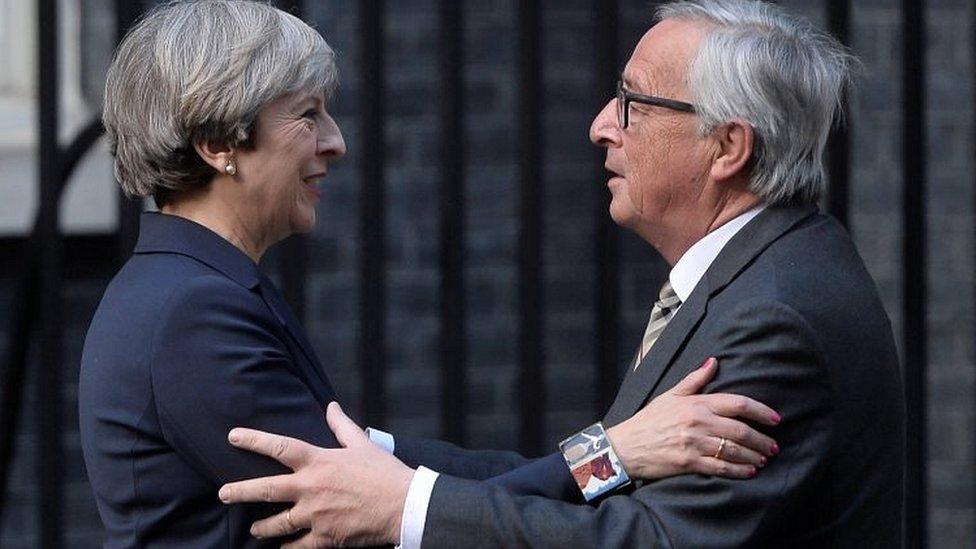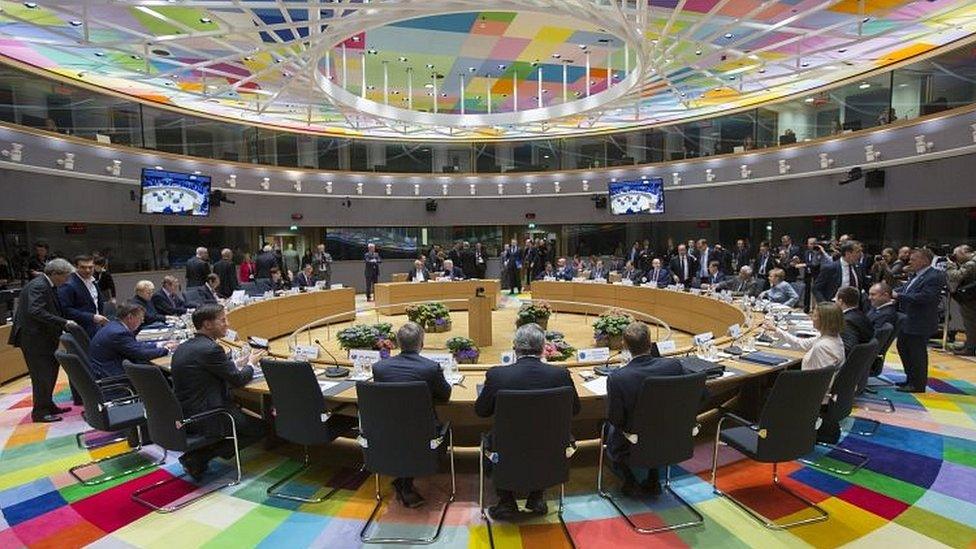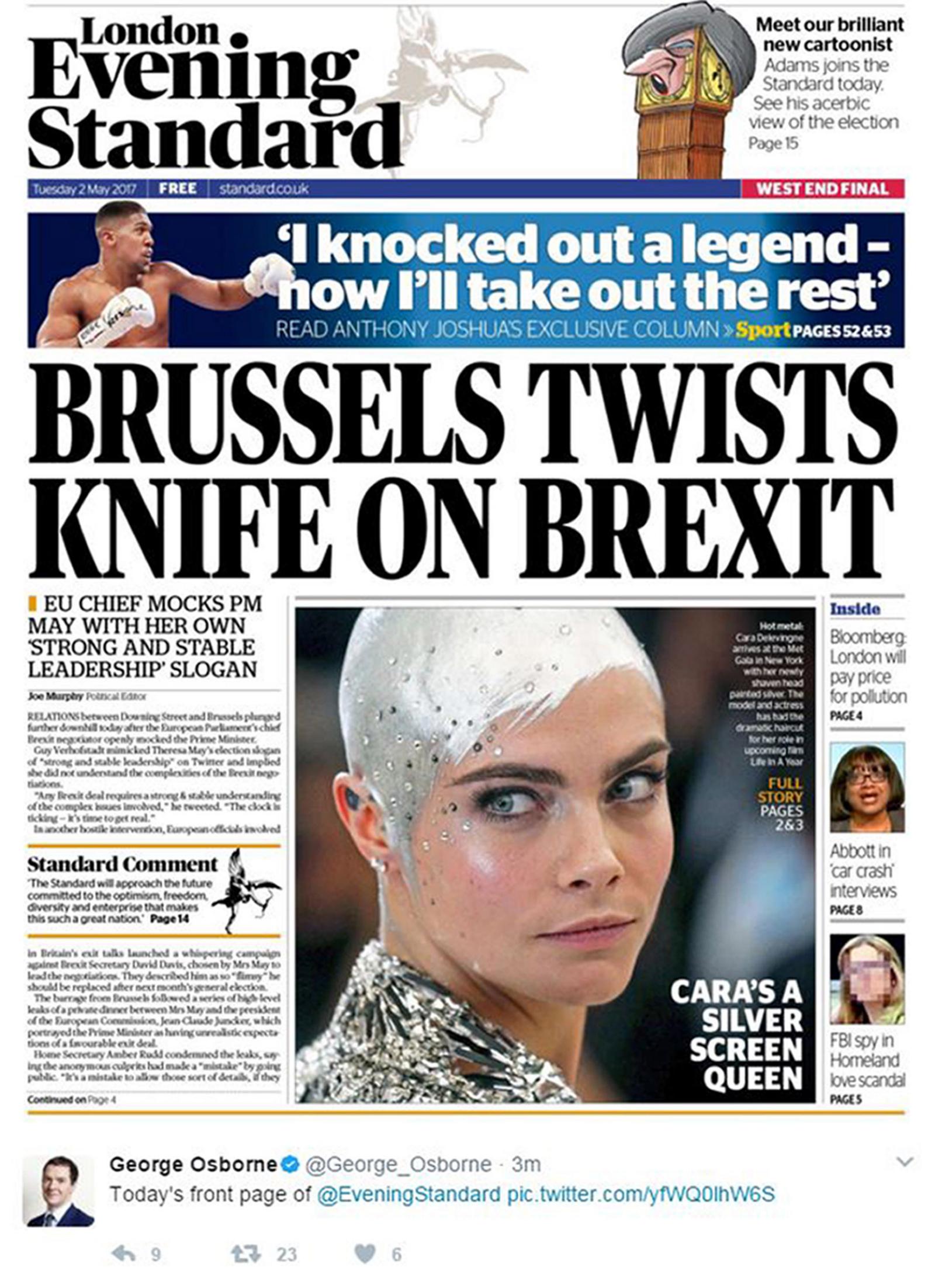Brexit: UK 'will not enter into briefing war' with EC
- Published
- comments

The UK will not enter into "a briefing war" with the European Commission over Brexit talks, Tory sources have said.
It follows reports in a German paper of repeated clashes between Theresa May and Commission president Jean-Claude Juncker at a Downing Street dinner.
EU sources claimed UK misunderstanding of the talks process, and ignorance about how Brussels works, could lead to no deal being agreed on the UK's exit.
Home Secretary Amber Rudd said the reports were "tittle-tattle".
She said the emergence of the reports was "not the right way" of negotiating, but the UK was committed to negotiating in "good faith".
According to the Frankfurter Allgemeine, external, the prime minister and Mr Juncker reportedly clashed last Wednesday over Mrs May's desire to make Brexit "a success" and whether the issue of protecting the rights of expat UK and EU nationals could be agreed as early as June.
The German newspaper's report of the dinner, which looks to have come via European Commission sources, said that after the PM said she wanted to "make Brexit a success", Mr Juncker's response was: "Brexit cannot be a success. The more I hear, the more sceptical I become."
And when she said the UK owes no money to the EU, the president informed her that she was not leaving a "golf club".
Home Secretary Amber Rudd told BBC Radio 4's Today the UK will be "discreet" in negotiations
The German newspaper report also suggested Mr Juncker said there would be no trade deal between the UK and the rest of the EU if the UK failed to pay the "divorce" bill which it is expected to be asked for.
Reports also claim that the morning after the dinner last Wednesday Mr Juncker told German chancellor Angela Merkel that Mrs May was "on a different galaxy".
A No 10 spokesman said the UK was approaching the talks constructively and in a spirit of goodwill towards the EU, but was also determined to make a success of leaving.
In a speech later on Tuesday, Mrs May will suggest the two-year Brexit process will be tough and the other 27 nations are "united in their determination to do a deal that works for them."
Theresa May: "From what I have seen of this account, I think it's Brussels gossip"
Ms Rudd said the UK would not be responding to the claims but the government had set out a clear plan and priorities for the talks and Mrs May was the best person to negotiate a Brexit deal that was in the UK's "national interest".
"Once you start engaging in gossip, in tittle-tattle in this way, it (will) carry on and who knows where it will lead?" she told BBC Breakfast.
"Nobody knows how much truth there is in gossip. But there are ways of conveying what is going on and this is not the right way.
"I do not recognise the tone in which this has been reported but I come back to the fact that it does make it clear that it is going to be a complex, potentially difficult negotiation at times and who do we want leading those - we want Theresa May leading them, not Jeremy Corbyn."

Analysis: By BBC Europe editor Katya Adler

Welcome to the EU/UK dominated Brexit Galaxy of Spin and Counter-Spin. A crazy old place. The galactic atmosphere is such these days that the dimensions of truth are elastic; at times, distorted.
Take the arguments this weekend over whether the Downing Street dinner last Wednesday at which Theresa May hosted European Commission President Jean-Claude Juncker was a complete disaster or not.
Not at all, insists Downing Street.
But it was a fiasco, according to Germany's Frankfurter Allgemeine Zeitung and thereafter hitting Twitter and headlines across the UK.
In Brussels, Politico quotes an EU diplomat saying the dinner went "badly, really badly". He reportedly went as far as to claim the British government was now "living in a different galaxy" to the EU when it came to Brexit expectations.
This all seems rather inflammatory, so who's right and who's stretching the truth?

The accounts of the dinner were seized upon by European politicians and opposition parties in the UK.
Guy Verhofstadt, the former Belgian prime minister who leads the Alliance of Liberals and Democrats for Europe, said it was time to "get real". He tweeted: "Any Brexit deal requires a strong and stable understanding of the complex issues involved."
Labour's shadow Brexit secretary Keir Starmer said Mrs May's stance was "wrong, not strong" while Lib Dem leader Tim Farron said the backlash in the European media was a "taste of things to come".

In his first leader as Evening Standard editor, George Osborne urged his party to give more details about their policies
"The reports show a prime minister who seems to have no idea how difficult these negotiations will be," he said.
In his first leader column as Evening Standard editor, external, former Conservative chancellor George Osborne urged Mrs May to spell out her intentions more clearly regarding Brexit and other issues.
"There's nothing wrong with repeating election campaign slogans," the article - published on ex-Tory MP Mr Osborne's first day in the editor's chair - stated.
"The problem comes when the election campaign amounts to no more than a slogan. If you ask for a blank cheque, don't be surprised if later it bounces."
The Green Party, meanwhile, has said voters should be given the chance to change their minds in a second "ratification referendum".
"Whoever wins this election has a mandate to negotiate on behalf of the British people - but that does not mean that they have a right to impose a final deal," said its co-leader Caroline Lucas.
But UKIP said Mr Juncker was playing "hardball" and Mrs May should not give any ground. "What is clear is that they won't be able to bully Britain and nor should they," its leader Paul Nuttall told the BBC's Daily Politics.

